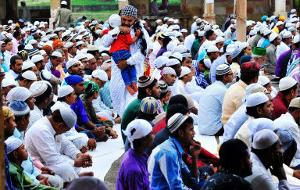 New Delhi, Sep 16: Even as minority politics takes centrestage in the wake of recent riots in Uttar Pradesh, a report by the Council for Social Development shows how the UPA government has failed to implement the recommendations of the Sachar Committee, with its response to Muslim deprivation at best being "cautious and minimalist". The report said most of the benefits intended for minorities were being cornered by either the majority population or non-Muslim minorities.
New Delhi, Sep 16: Even as minority politics takes centrestage in the wake of recent riots in Uttar Pradesh, a report by the Council for Social Development shows how the UPA government has failed to implement the recommendations of the Sachar Committee, with its response to Muslim deprivation at best being "cautious and minimalist". The report said most of the benefits intended for minorities were being cornered by either the majority population or non-Muslim minorities.
The report listed misplaced focus of minority-oriented programmes, lack of funds and fear of 'minority appeasement' taunts as the reasons for government's failure to fulfil its promises.
The 'Social Development Report 2012: Minorities at the Margins' was prepared by scholars such as Zoya Hasan, Mushirul Hasan, Tanweer Fazal, Javed Alam Khan and Abusaleh Sharif among others.
For example, the report illustrates how programmes intended to improve school education among Muslims has focused on modernization of madarsas even though only 4% Muslims go there for education. In higher studies, the government has focused on providing assistance to minority institutions rather than expanding the overall education network to include Muslims.
It also brought out the failure of multi-sectoral development programme (MSDP) — launched after the Sachar Committee's report — targeting 90 districts with around 25% Muslim population for infrastructure development through enhanced funding. The report noted that benefits of the scheme reached only 30% of Muslim population in these areas, indicating others have cornered most of the resources. In states such as Bihar and Uttar Pradesh (with high concentration of Muslims), infrastructure projects have been diverted to non-minority areas.
The Reserve Bank of India's efforts to extend banking and credit facilities to Muslims, a major fallout of the Sachar Committee report which said Muslims were out of the banking system, has also ended up benefiting non-Muslim minorities whose socio-economic status is comparable to upper caste Hindus, the report said.
"Diffidence at the policy level to clearly focus on Muslim deprivation translates into active reluctance by the implementing agencies on the ground to target the Muslims even in districts with high Muslim concentration," the report said.
Mushirul Hasan blamed the minority affairs ministry for such failures. He told TOI, "The ministry has become a liability. It is devoid of any ideas and lacks social commitment."
According to the report, both funding and its utilization have been a problem. In the 11th plan, allocation for minorities was 6% of the total outlay with minority affairs ministry's share being only 0.79%. The report called it insignificant to address minority development. It also noted that unlike SC/ST, budgetary plans for minorities were not proportional to their population.
Even these funds are not utilized properly. During 2007-2012, state governments did not utilize even half of the allocated funds. Twelve states utilized less than 50% of funds and some states spent only 20%. States such as Bihar, UP, Maharashtra and Assam (all with high concentration of Muslims) were in the category of those that spent less than 50%.
Government's scholarship scheme for Muslim students has been widely praised, but the report found it to be too little and poorly implemented. While 2.45 crore Muslim students were enrolled up to upper primary level (2009-10 data), the government has provided 24 lakh pre-matric scholarships for minorities, the report said.
It also found the scholarship amount of Rs 1,000 to be too little. It noted that compared with SC/ST, the scheme was discriminatory. While income eligibility criteria for SC/ST to avail scholarship was kept at Rs 2 lakh per annum, for minorities it is only Rs 1 lakh.






Comments
Add new comment